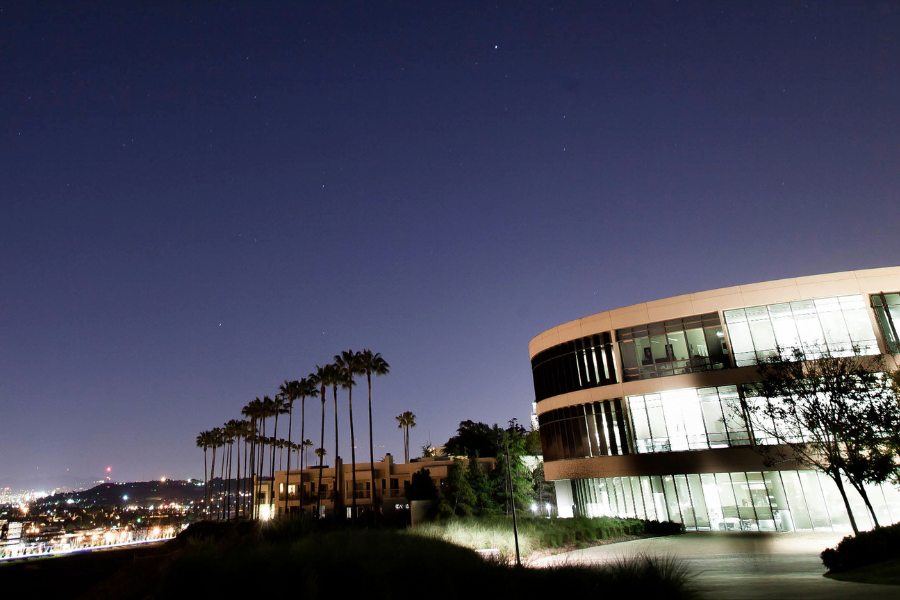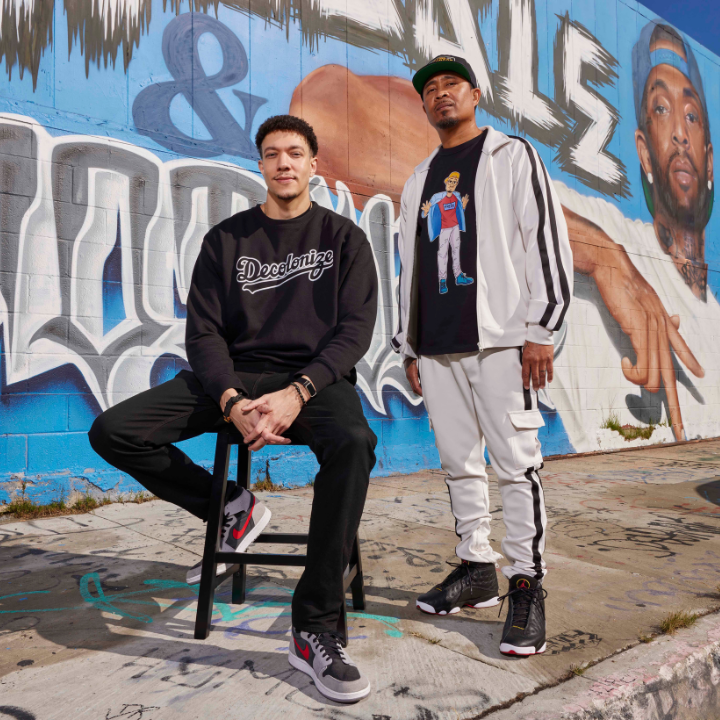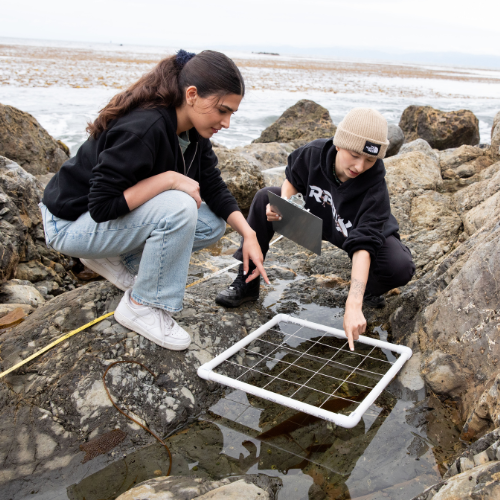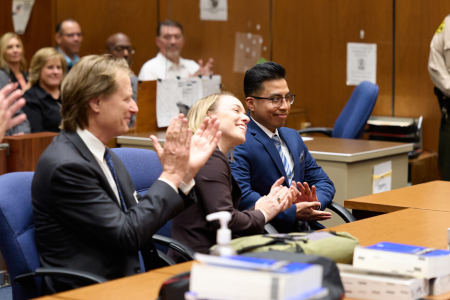
The bustling metropolis of Los Angeles is the global epicenter of creativity and innovation, rich in cultural diversity and abundant in biodiversity. Learning comes alive with the city—the people, the environment, the culture—woven into the fabric of the Loyola Marymount University experience. From the coast, where students research sustainable practices, to downtown courtrooms, where they engage in life-changing advocacy, to business and industry, where they help build brands with cultural consciousness, Los Angeles is LMU’s living, breathing classroom.
Empowering L.A.’s Future Changemakers
LMU’s Applied Learning in Societal Transformation (A-LIST) program is an innovative marketing pathway created to “shape the changemakers of tomorrow” by helping students understand a wide range of consumer cultures and promote inclusive societal change. Founded in 2018 by Mitch Hamilton and Julian Saint Clair, associate professors of marketing, the one-of-a-kind program combines custom-built curriculum, hands-on experiential learning, and a triple bottom line philosophy that underscores the importance of “people + planet + profit.”

“A key focus of A-LIST is looking at different intersections of culture and society,” says Saint Clair. “This can be difficult in places that only have certain kinds of diversity. No textbook exists for what we teach. By necessity we had to create this curriculum from the ground up. People in L.A. come from such widely different backgrounds— it lets us dig into various subcultures that coexist with and influence mainstream culture.”
A-LIST allows students to develop impressive marketing portfolios of work, collaborating directly with a range of influential L.A.-based industry leaders. “Imagine being in a job interview and explaining how you helped Snoop Dogg launch a vegan snack brand that you can find in hundreds of stores across the country,” says Hamilton, of students’ hands-on experience working with clients such as Jessica Alba’s The Honest Company, the National Basketball Players Association, Sony Pictures, the City of Compton, and others. “There’s so much value in unique portfolio pieces like this.”
Following a course previously co-taught by the late Grammy Award-winning rapper and entrepreneur Nipsey Hussle, one recent upper-level marketing course honored the artist’s legacy and the lasting impact of his influential Marathon brand. The class, co-taught by Hamilton and L.A.-based music and entertainment business executive David Gross, fused scholarship with real-world experience to show students the power of culture and authenticity when building a brand.
Weekly guest lectures featured successful music, entertainment, and sports leaders who were inspired by Hussle. By examining the Marathon brand from various perspectives, students engaged in a unique, dynamic learning experience.
“A-LIST is all about culture and diversity, and what city is more culturally diverse than Los Angeles?” says Hamilton. “We’re only a handful of years into this, and we already have former students that are true changemakers in their respective industries.”
Bridging Environmental Science and Community
From the coastline of the Pacific Ocean to its city parks, Los Angeles is a living laboratory for LMU students to conduct scientific research.
“Los Angeles is a brilliant natural experiment that inspires endless research questions my team and I can ask as applied ecologists, exploring the boundaries between the built and natural environments,” says Demian Willette, associate professor of biology. “We are particularly interested in ecosystem services—the free benefits nature provides to people—and with over 4 million people in L.A., those benefits can be substantial for Angelenos.”

Willette and his team are helping restore Ascot Hills Park, an urban park in northeast L.A. In partnership with local organizations, the team is conducting quantitative field experiments aimed at optimizing restoration efforts. In 2023, LMU and the local non-profit Seed to Landscape agreed to support the largest micro-forest project in Los Angeles to boost biodiversity, support environmental justice, and build climate resilience.
“We are part of this global city that is at the forefront of addressing environmental and societal challenges,” says Willette. “Our teaching and research benefit from that future orientation that is uniquely L.A.”
Willette’s lab examines shifts in communities due to invasive species and environmental change, and investigates the biodiversity and connectivity of over-exploited natural resources to help ensure more sustainable use.
While exploring solutions to environmental challenges, students engage in faculty-mentored independent research and connect with community partners and local schools. Projects in Willette’s lab take advantage of access to the 12 terrestrial and aquatic ecosystems situated within a 60-minute drive of LMU’s campus and have a measurable impact in the city and beyond.
Advocating for Youth Justice
Though the younger generation holds the key to tomorrow’s possibilities, some children’s futures hang in the balance of justice’s scales. The core mission of LMU Loyola Law School’s Center for Juvenile Law and Policy is to foster systemic reform of the Los Angeles County juvenile justice system by providing legal and social services for youth and their families. That mission gives law students an extraordinary chance to make a life-changing difference.
The center’s heart and soul is found in its community legal clinics, which advocate for children in the justice and education systems while preparing law students to serve in the public interest. The Juvenile Innocence and Fair Sentencing Clinic represents wrongfully convicted youth and juveniles sentenced to unjust adult prison sentences; the Juvenile Justice Clinic provides holistic advocacy for youth; and the Youth Justice Education Clinic focuses on children with disabilities whose unmet educational needs have led to involvement in the legal system. “We advocate for a holistic model where we don’t just represent youth in court, but we try to identify the root causes of delinquency and gang involvement, and connect youth with treatment and services,” says Sean Kennedy, executive director of CJLP.

In addition to contributing energy, learning, and passion to these clinics, law students represent youth charged with offenses in Los Angeles County Superior Court. They engage directly with the children, and are responsible for all aspects of their cases, from interviewing, discovery and investigations, to written motions, trials, and post-sentencing. By connecting their juvenile clients with community-based gang experts – many of whom law students previously represented and freed from prison – they facilitate a transition out of gang involvement through a “whole person” approach.
Beyond the courtroom, the center has also made a far-reaching impact in the world of law enforcement. In collaboration with students, Kennedy co-authored a report about a major threat to justice involving corrupt “deputy gangs” within the L.A. County Sheriff’s Department — a troubling issue that sparked public hearings by the Civilian Oversight Commission. The report encouraged reform within the department and its recommendations have since been cited in legislation.
LMU’s commitment to societal transformation resonates throughout the bustling city streets. Leveraging our relationships and the unique advantage of our location, students immerse themselves in hands-on experiences, bridging the gap between theory and practice, and they emerge as tomorrow’s changemakers, ready to tackle the complex challenges of our world. In classrooms, courtrooms, and communities, LMU remains steadfast in its dedication to fostering a culture of innovation, diversity, and social justice, ensuring that the spirit of transformation continues to thrive within its walls, into the city of Los Angeles, and beyond.



